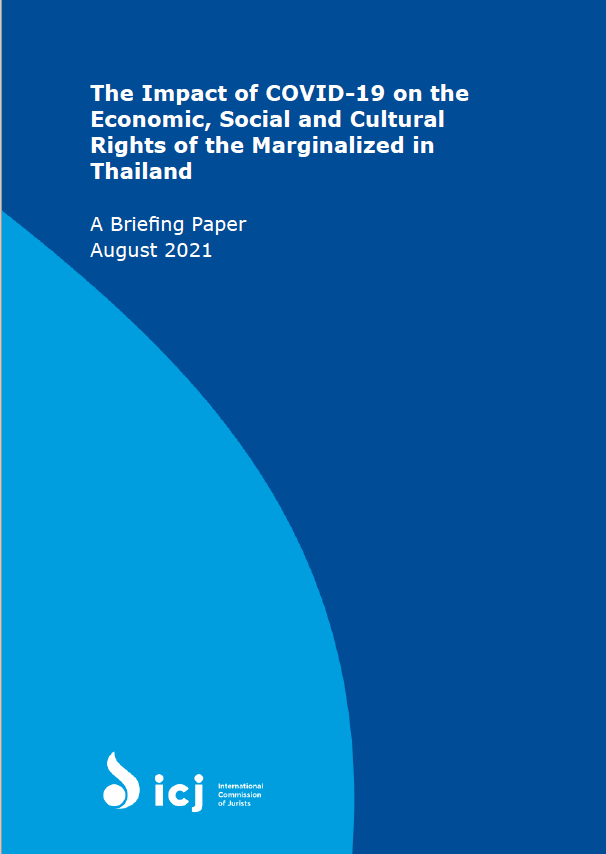Thailand must ensure that its responses to the COVID-19 pandemic comply with the international human rights law protections for economic, social and cultural rights, the ICJ said in a new briefing paper published today.
“We call on the Thai authorities to address the discriminatory impact of the pandemic on already marginalized and disadvantaged persons in Thailand. Though a full range of rights should be realized by Thai authorities, it is particularly important for Thai authorities to take immediate measures to ensure access to health facilities, goods and services necessary to combat COVID-19 to all people. This includes COVID-19 vaccines.”, said Sanhawan Srisod, ICJ Associate Legal Advisor.
The briefing paper details the disproportionate impact of COVID-19 on the rights of:
- refugees, asylum seekers, stateless persons and migrant workers;
- LGBT persons;
- indigenous persons;
- sex workers;
- persons deprived of their liberty; and
- persons with disabilities.
The briefing paper offers detailed recommendations to the relevant Thai authorities, including that they should:
- Design and adopt targeted measures, aimed to protecting the right to health and other economic, social and cultural rights, in consultation with members of marginalized groups;
- Ensure that all persons, including members of marginalized groups, have adequate access to all healthcare facilities, services and goods; information on the prevention, early diagnosis and treatment of COVID-19; social security, relief, and support schemes to alleviate economic hardships arising from COVID-19; and essential services including nutritious food, sufficient water and sanitation, secure housing, electricity and services, in the midst of the pandemic;
- Encourage, empower, support and coordinate with businesses to ensure individuals from marginalized groups have access to healthcare services without discrimination;
- Refrain from deprioritizing health services that are particularly relevant to members of marginalized groups;
- Not penalize or target members of marginalized groups for immigration/law enforcement when seeking access to healthcare services;
- Put in place a temporary suspension of enforced returns of refugees, asylum seekers, stateless persons and foreign migrant workers during the pandemic; and
- Prevent overcrowding in prisons and places of detention and employ alternative measures or release at-risk categories of detainees.
The briefing paper is published alongside an explanatory animation, by which the ICJ hopes to widely disseminate information on the Thai authorities’ legal obligations in terms of ESCR in the context of the COVID-19 pandemic.
“It is important that all people in Thailand know and understand their economic, social and cultural rights. Without this knowledge it is difficult to ensure that government is held to account for the human rights obligations it has taken on by acceding to treaties such as the International Covenant on Economic, Social and Cultural Rights”, said Sanhawan Srisod.
This briefing paper will form the basis for an online panel discussion titled “International Standards on Economic, Social and Cultural Rights and the Impact of COVID-19 on People from Marginalized Groups”.
The discussion will be held on 25 August 2021, co-hosted by the ICJ, Ministry of Justice’s Department of Rights and Liberties Protection, the EU Delegation to Thailand, Office of the United Nations High Commissioner for Human Rights (OHCHR), Thammasat University’s Faculty of Law and Amnesty International Thailand.
Background
On 25 March 2020, the Thai government declared an “emergency situation” in all areas of Thailand, purportedly to combat the COVID-19 outbreak, in the exercise of its power under the Emergency Decree on Public Administration in Emergency Situation B.E. 2548. The Emergency Declaration has been extended 13 times, most recently on 30 July 2021 for a period between 1 August and 31 August 2021. A series of regulations containing several Emergency Decree measures have been periodically announced pursuant to Emergency Decree powers.
This briefing paper complements the ICJ’s report, Living Like People Who Die Slowly: The Need for Right to Health Compliant COVID-19 Responses, released in September 2020, which explains the international human rights law and standards on the right to health and documents the adverse human rights effects wrought by the COVID-19 pandemic.
Legal Briefing in English and Thai.
Explainer Video on “The Impact of COVID-19 on the Economic, Social and Cultural Rights of Individuals from Marginalized Groups”, which will be screened at the event, is available in English and Thai.
Further reading
Thailand: COVID-19 response measures must not undermine freedom of expression and information
Thailand: COVID-19 Emergency Decree must not be used to undermine human rights
New ICJ global report shows that the right to health must be central to State responses to COVID-19




